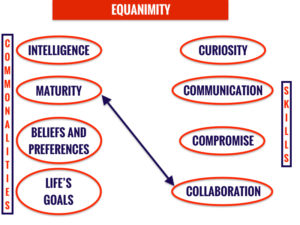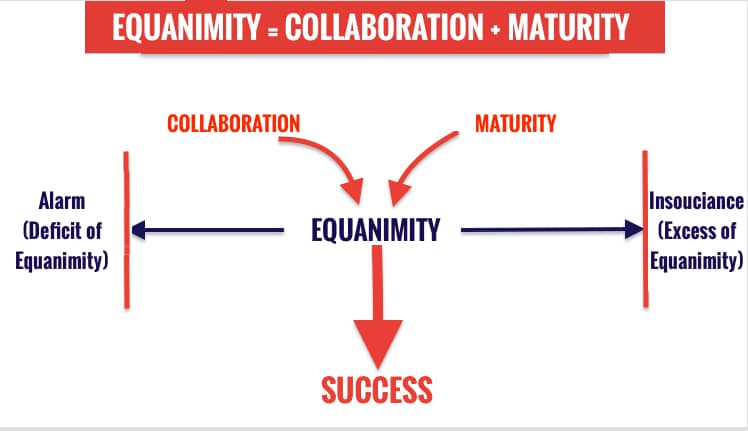Equanimity is defined in the dictionary as "mental calmness, composure, and evenness of temper, especially in a difficult situation." It is a character trait and virtue that you want when you see yourself desiring to get to a goal smoothly and with the least waste of resources on drama, error, overwhelm and fear, which is obviously a function of having good boundaries with doors rather than boundary holes. Equanimity is a combination of the Skill of Collaboration with the trait (or Commonality) of Maturity.
 We move from a focus on each other, and the actions of teamwork, to a new alignment with each other that has us as turning outward into the world, our actions as a team within it, and rewards and contributions to the community as a couple. We are unified and focused on both our contribution to it, and the rewards of meeting our goals in it, through the Virtues of Collaboration as a skill of commitment.
We move from a focus on each other, and the actions of teamwork, to a new alignment with each other that has us as turning outward into the world, our actions as a team within it, and rewards and contributions to the community as a couple. We are unified and focused on both our contribution to it, and the rewards of meeting our goals in it, through the Virtues of Collaboration as a skill of commitment.
What makes Equanimity unique as a character virtue, is that it addresses the focus on getting to a goal as if one had great shock absorbers on one's automobile - a smooth ride through trouble and challenges which only the mature among us can achieve, which also assumes the mature, realistic expectation of some "bumps in the road of life," or "the realism that with no pain, there is no gain."
There once was a wonderful, tough father that a woman had and went to for advice and hugs after she lost her job. And when she did, he told her the most realistic, comforting statement a father ever said: "Honey, just enjoy the ride. And you'll be fine." This is like "This too shall pass" as advice, only better. It has a pleasant, happy message.
This is Equanimity, and any mature woman will need this trait in their partner. It will feel like parenting only better. It will come from the fatherly or motherly nature of the partner. Which means that in terms of personality style, the maternal nature of the Kings, Queens and Lovers will help the Equanimity, and in cases of the paternal nature of Warriors and Magicians, there will be more Equanimity.
 From Aristotle's Golden Mean, we learn that every virtue also has two vices. In the case of Equanimity, the vice of excess is Insouciance, or "overconfidence in stability," like being a foolish King, or Emperor with no Clothes.
From Aristotle's Golden Mean, we learn that every virtue also has two vices. In the case of Equanimity, the vice of excess is Insouciance, or "overconfidence in stability," like being a foolish King, or Emperor with no Clothes.
The vice of deficit of Equanimity is called Alarm, where one is "making mountains out of molehills", or "seeing a tempest in the teapot."
Equanimity has bearing on our performance in phase three - intellectual attraction - step eight, where we seek to amplify the best virtues toward our goals. It is what causes us to see our mate as "stable" in our lives, and us to feel that we will have losses, but will have more gains that losses with them.

